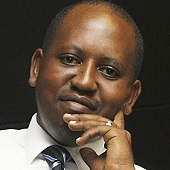South Africa: Is This What We Want the World To See?
South Africa’s socio-economic strains are becoming untenable.
October 23, 2015
He would probably not be amused by the idea of his being called Mr. Teflon, but to be honest, this is exactly what crossed my mind as I witnessed Finance Minister Nhlanhla Nene step right into a maelstrom that rocked South Africa’s parliament this past week.
For a moment, it looked as if his medium-term budget policy statement would be abandoned, as members of the Economic Freedom Fighters demanded that parliament ditch its program and focus on the escalating wave of national protests over proposed hikes in university fees.
Never in the history of post-apartheid South Africa has a finance minister seen his budget speech delayed and disrupted, but it has happened now.
For close to an hour, Nene had nothing to say. It was not what he had expected.
Chaotic scenes
Those barricaded inside the National Assembly, including Nene, tried their best to put up a “business as usual” sort of aura.
But the chaotic scenes just outside the building in which they were holed up showed the country – and the world – a different and a much more troubling picture.
I shudder to think what would have happened had Nene decided to go deliver his speech on the steps of parliament where the student protesters were battling riot police.
But even to an uninitiated eye, it is easy to see that South Africa’s socio-economic strains are becoming untenable.
More worrying, though, is an apparent lack of coherent and decisive action to ameliorate the very apparent residual ills of apartheid – poverty, inequality and unemployment.
That thousands of students – mostly black and some white – had to bulldoze their way into parliament in order to be heard speaks to an urgent need for this government to get its act together.
The government needs to articulate why 21 years after the country was supposed to have had a fresh start — there still remains such entrenched poverty, lawlessness, corruption and a total breakdown in societal mores.
Increasingly, this is the picture that the South Africa of today keeps portraying to the outside world and there seems to be nothing to alter it.
Nothing much has changed
This week, three years ago, The Economist magazine ran a cover story entitled “Sad South Africa: Cry the beloved country,” raising the ire of this administration.
The article was slammed by the South African government as ill-informed, misguided and prejudicial. It was published about two months after the Marikana massacre.
Fast forward to 2015 — and it becomes even more apparent that very little has changed since that Economist article.
This picture of a country in perpetual paralysis is very damaging and risks undoing even the smallest amount of progress that has been achieved in the 21 years since the year that brought Nelson Mandela to power.
Our government should acknowledge that 1994 is not a distant memory, even to the current generation of student protesters.
A poster I saw on social media carried by one of the students had these words: “Our parents were promised dreams in 1994. We are here demanding a refund.”
Judging from Nene’s speech, I can only imagine that when that refund cheque is cashed, there will most likely be insufficient funds written all over it.
Thug tactics
Moreover, history has shown that jackboot tactics are not the way to deal with public discontent. And it cannot be any different here, especially in a country with memories of a government that could neither feel, see nor hear what the majority of this country suffered.
South Africa needs to change course and the time to do that is now, or else the scenes of yesterday will repeat and will turn even uglier.
That is what happened pre-1994. Student or no student, no one should not have to bulldoze their way into the National Assembly to demand answers about how the government intends to deal with their plight.
The government knows full well that there is unfinished business in bringing about true emancipation of those it represents.
Although Nene managed to eventually deliver his speech, he and the rest of the government should perhaps understand that the students involved in the scuffles with the riot police outside never heard a word of what he was saying.
In the age of social media, it is the language of the “hashtag” that this generation understands. And that means taking an open, honest, decisive and pragmatic approach to being heard.
So government, you better get on with the program. #IndecisionMustFall. We need South Africa to rise to its true potential as a free and prosperous country.
Editor’s Note: The article was originally published in IOL.
Takeaways
Chaotic scenes outside the South African parliament shows the world a very troubling picture.
There is lack of action to ameliorate the residual ills of apartheid – poverty and inequality.
Why is there lawlessness and a total breakdown in societal mores even 21 years after apartheid?
“Our parents were promised dreams in 1994. We are here demanding a refund.”
The South African government knows it still needs to bring true emancipation of those it represents.
